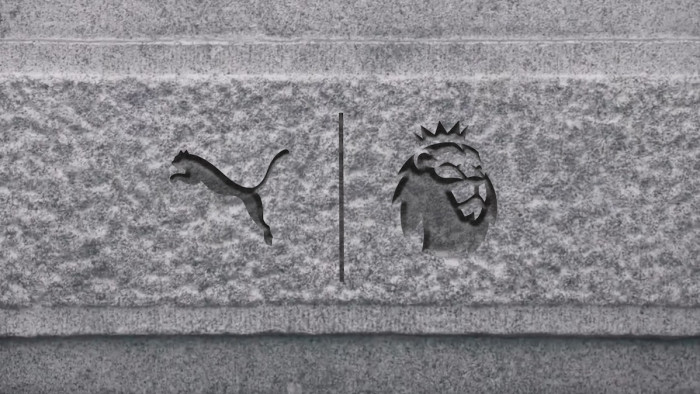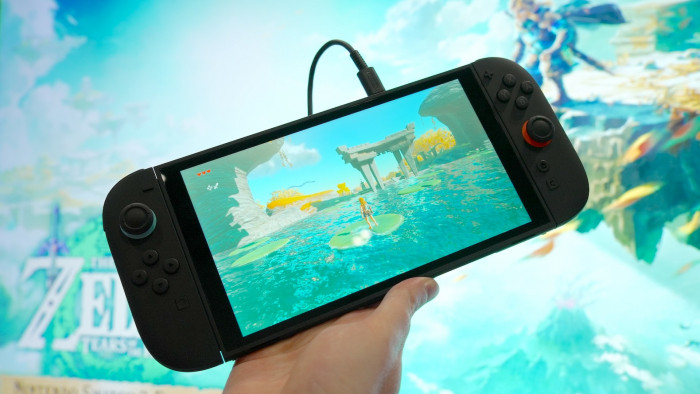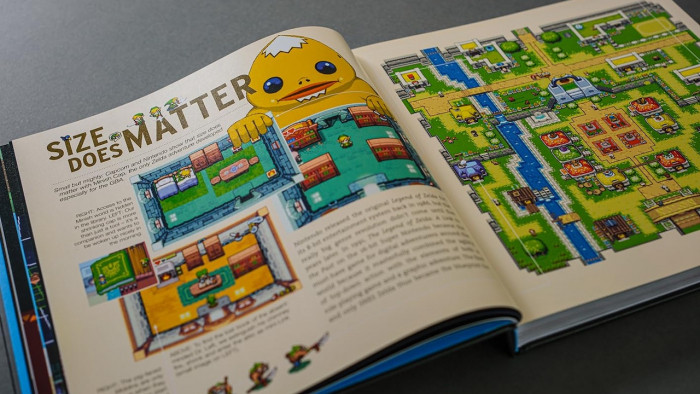Football Manager scouts brutally assessed our crap kickabout to see how shit we really are
Would our childhood dreams be ruined by the world's most popular football simulator?


I remember a passage from my childhood hero Dennis Bergkamp’s autobiography Stillness and Speed, in which my other childhood hero Thierry Henry describes a technique he and Bergkamp would use to eliminate goalkeepers and ensure certain goals:
Most strikers control the ball then finish. The great strikers know how to pause. You control the ball – then you pause – then you finish … I’m not looking at the ball. I know where it is… Control it. When the goalkeeper makes the motion of coming out to you . . . that’s when you pause. And when you pause you look at the goalkeeper. And he freezes. You’ve got to freeze him. It doesn’t have to be too long. But you have to freeze the goalkeeper. Let’s say he wants to rush at you. If you’re looking down at the ball, he’ll rush at you and you won’t even see him. That’s why you have to look at him… For me it’s very important. When you don’t look at the goalkeeper, they can sometimes read where you’re going to put it. But if you break his momentum . . . sometimes the finish doesn’t even have to be that great. Freeze him! It doesn’t matter who the goalkeeper is. It works with everybody.
I remember this passage now, sat at my desk, thinking that this is just the sort of thing I would do if I were a professional footballer. It’s something I daydream about far more often than a grown adult who is not – and never will be – a professional footballer should. I do not, however, remember this passage during the game I’m playing in front of Sports Interactive’s team of scouts. These scouts – just three of SI’s over 1,300-strong scouting network – usually spend their days watching, analysing and evaluating actual footballers’ abilities for Football Manager’s formidable database, but have today agreed to observe a ragtag bunch of ShortList Magazine staff, watching us huff around a lunchtime kickabout, and then give us our brutally honest stats.

Stillness
They are watching on, brows furrowed, clipboards out, as a ball finds me miraculously one-on-one with the opposition goalkeeper. I am, generously speaking, ‘nowhere near onside’ but play has been kindly allowed to continue and I have so much space and so much time. I have enough time to freeze the goalkeeper so emphatically that they could thaw him out thousands of years in the future and put him in a museum exhibit titled: ‘A Decisively Beaten Goalkeeper Of The 21st Century.’ I do not pause, control, look him up and down, get the size of him and stare into the whites of his eyes; because I do not remember this passage, because it doesn’t instinctively recall itself to my mind’s eye; and because, crucially, I am not a professional footballer.
Presented with a clear-cut-chance, a professional footballer’s brain factors everything – angles, speed, momentum, wind, trajectory, composure and space – in split-seconds to make their decision. Mine just goes “Oh fuck. Shit. Fuck. I really hope I score this, that would be sick, then they’d definitely have to give me at least 15 for finishing. Fuck. Don’t miss. Don’t miss. Please don’t miss. Fuck. Where’s the goal gone? And where’s the ball?” then I look down at the ball, contort my legs in a shooting motion, and realise I’ve limply passed the ball straight at the keeper, trying to beat him at his near post, which he is standing completely in front of, having left the rest of the goal exposed. In short, it’s a dreadful effort, and I wince as I watch the scouts’ pens marking damning feedback on their clipboards while pissing themselves.
I get another chance later in the game, where a gift of a through-ball again puts me one-on-one with my old foe, the goalkeeper Matt, our esteemed art director, to the right of the goal. Still reeling from my earlier sitter, I opt to take even less time than before, swinging a rash leg at the ball in an attempt to catch the keeper off-guard by taking a shot with an intended direction that even I am unsure of. It sails harmlessly wide of the keeper’s near post and I fall over. I don’t have another shot in the rest of the game and I’d made a point of putting myself up front. I thought it could have been different. Bergkamp, Henry, Cross.

Speed
I’m watching the ShortList XI make their Premier League debut against Chelsea at Stamford Bridge. It’s the 55th minute and we’re 11-0 down. In-game Tristan Cross nicks the ball off Eden Hazard, runs nearly the full length of the pitch and finds himself one-on-one with Thibaut Courtois down the right hand side, a near-identical position to my second clear-cut chance. This could be my redemption. Perhaps the subdued setting of a lunchtime kickabout doesn’t bring out the best in Tristan Cross. Perhaps I simply need the roar of a packed stadium to rise to the occasion. If in-game Tristan Cross can score against in-game Courtois, perhaps there’s a possibility real-life Tristan Cross could score against real-life Courtois, because in-game Tristan Cross is an accurate representation of real-life Tristan Cross, because those scouts just know raw talent when they see it. Maybe – just maybe – I’m actually wicked…
In-game Tristan Cross takes a rash shot which sails harmlessly wide of the keeper’s near post.
A crushing moment from the turn of my 15th birthday: Staring at the ‘create-a-player’ screen in that year’s Pro Evo, having made a virtual wish-fulfilment version of the player I imagined I would be when I grew up, I saw that the game now let you enter an age that was younger than my own. This moment killed my sole childhood dream, and by extension, me.
Despite having shown scant evidence that I possessed enough ability to start for my relegation-mired under-16s side, let alone so much that I might one day be paid for the privilege at the highest level, I had always just that I would suddenly, inexplicably, develop world-class talent at some point. I just wasn’t old enough yet. I’d always had to lie about my age when creating virtual ‘me’ before as these games couldn’t even conceive of there being an 11-year-old in the Premier League, which meant there was plenty of time. These in-game avatars allowed me to circumvent the inconveniently slow ageing process and experience the career I was destined without waiting. I would put myself in the games, make myself as short as the game would allow with a ginger mop on top; whack all of my speed, dribbling and shooting stats up to 99; and then bang in enough goals for my beloved Arsenal and my beloved Wales to live on in the collective hearts, minds, and souls of every fan for all eternity.
But now you could be 13 in PES, and I was 14 already, about to be 15. I was too old, it was too late. I was never going to become a professional footballer. The in-game Tristan Crosses I’d made on countless PES and FIFAs stopped feeling like sneak-previews of my certain future and became tragic embodiments of my pathetic failures and delusions. There was no longer a chance of Arsene Wenger strolling past one of my kickabouts, clocking me as a rough diamond of a forward and signing me up. This was the point I turned to Football Manager. Managing a football team is a reasonable dream. The only true upper-age-limit for becoming a manager is: dead.
It’s hard trying to explain the unique allure of Football Manager, especially when naysayers and newcomers find themselves presented with essentially a series of spreadsheets and fictional emails. On a surface level, it seems less like a game and more like an admin job. But this is the joy of it. This is exactly why it’s so immersive. There are no 3D-rendered boardrooms to wander about in, no animations of in-game ‘you’ telling assembled journos you think Jose Mourinho’s out of his depth, no cut-scenes where a fake sheikh covertly films you discussing bungs. It’s just stats and matches. This means it’s entirely up to you to fill in the gaps, to imagine you’re leading a rousing team-talk before a Champions League final and not in your dank bedroom, up at 4am, furiously clicking on bits of text and gesticulating in at a grubby-screen.
And because Football Manager’s phenomenal database and attention to detail is so revered – to the point they have numerous relationships with professional clubs, including three in the Premier League, Sports Interactive’s Research Lead (and one of the three scouts checking us out) Stephen Davidson tells me – it has an air of legitimacy. There’s a reason people still send ‘Football Manager CVs’ in their droves every time a real-world position becomes vacant at least a decade after the novelty of wasting a club secretary’s time has well-and-truly worn off: these people are convinced their achievements in FM actually demonstrate genuine managerial acumen.
I’m wicked at FM. Like, it’s one of the few things in my life I would confidently say I’m good at. If I’d sunk as much time into learning an instrument and working on my personal relationships as I have unearthing Belarusian wonderkids and getting Barry Town to the group stages of the Champions League, I’d be headlining The Proms every year and would also have friends. But I made my choice, and I don’t regret it.
Or, at least, I didn’t, until a fit of pique while bored at university saw me sign up to a discounted FA Level 1 Coaching Badge course. I got the badge in the end (as did everyone on the course), but I also had to lead a thoroughly harrowing dummy training session. Turns out it doesn’t matter how intimate your knowledge of various tactical systems is, if you can’t stand by the side of a pitch and bellow “come on lads, get stuck in!” with at least more gravitas than a schoolboy with his little puberty-addled voice trying to convince his mum he hasn’t had a puff on a cigarette even though she can smell it and he obviously has, then you probably aren’t cut out to be a football manager after all. You can’t conduct an actual teamtalk via a laptop, you have to stand in front of your squad and command their respect using inspirational words and presence. That’s why Sam Allardyce is, and always will be, a better manager than you, even if you know what the gegenpress is.
I was deflated. Football Manager had royally duped me just as FIFA and PES had before. Then I realised that I had simply duped myself. I was a rube. A no-good rube. None of these games actually promised a real correlation between themselves and the real thing, the wish-fulfilment was entirely of my own delusion. I’d always thought I was above sending in a Football Manager CV, but there I was, believing my own fantasies, thinking I was the second (and more successful) coming of Andre Villas-Boas.
I wanted a video game that just once wouldn’t let me project an idealised version of myself onto it; a video game which unequivocally told me exactly how shit I actually was. And so I arranged this Football Manager-observed kickabout. And yet, in the back of my mind, in my hope of hopes, part of me still thought: what if? What if it was simply a failing of South Wales’ youth system – with its quagmire pitches and “fucking hit it, son!” mentality – that I had slipped through? What if, despite my obvious failings to become or ever be a footballer, there was something there – a spark, a flair, a glimmer of talent? The Football Manager scouting network – a network that had identified the potential of the likes of Lionel Messi and Gareth Bale way before they became superstars – would answer my questions and put me out of my misery once and for all.
It should be noted that our kickabout experiment was slightly flawed, in that FM’s scouts don’t normally just turn up, watch one game and then decide their scores. “Arguably a researcher ought to feel relatively confident about entering most attributes after 10 games or so,” says Davidson. “A player's profile is never really finished, we watch players as often as possible, for as long as they're playing football, and update their profiles accordingly.”
And it’s not like they just retrospectively change every player’s stats according to how well they did in their most recent season, either. “To look back at a single player's profile across the years in our research tools you'd see thousands of small changes combining to reflect a player's career arc. What that looks like varies from player to player. It might be development from a 16 year-old youth-teamer to ‘peak’ level followed by potential decline and/or change (for example positional development as a player loses their pace), or it might trace a player's initial potential not being realised and chart their progress through increasingly less high-profile leagues or even retirement at an early age. We’re not only updating their attributes multiple times a year but also logging injuries sustained, noting personal relationships, recording playing histories with appearances/goals and much more for each annual release of the game and its updates.” So, basically, these scouts were going into our game blind, having no previous conception of how good or shit we were at any stage of our amateur careers before. They were going to have to come with all of our stats from scratch.

Stephen Davidson and his boys impressed by the quality on show
This seemed a Herculean task, and so I asked Davidson how his scouts compile so much data on the regular, given that they probably can’t (yet) afford to assign one scout to each player in order to accurately ascertain each specific stat, from jumping reach to work rate. “Each position has its own ‘key’ attributes so a researcher can quite quickly get a handle on some things: heading, tackling, marking, positioning for defensive players; finishing, composure, movement, off the ball for strikers; vision, passing, decision[-making] for creative players; and so on. But it might be a whole season before you see a particular player take a throw-in, a free-kick or take a penalty, let alone see them do each enough times to make an accurate judgement.”
It also dawned on me that the scouts are unlikely to be going down to watch Tamworth week in, week out, and I wanted to know the extent of the educated guesswork or ‘benchmarking’ involved. “Benchmarking tends to happen more for players in relation to other players, be they at the same club, in the same league or on a worldwide basis. Our scale has to include the greatest players of all time at one end and any number of players performing at lower levels below. Keeping that in mind and trying to create an accurate profile by thoughtfully combining all the hundreds of fields of data we capture for each player is always helpful when thinking about what value to give that National League striker for finishing, even if he's banging them in for fun...”
With all that in mind – that the scouts would ideally have had data on us beforehand, that there were inevitably going to be a few stats they wouldn’t see us perform, and that even if I was the best player on the park, they would evaluate me relative to the park and not give me the same technique as Mesut Ozil even if I sumptuously turned someone inside-out at some point – and the fact that I actually played pretty poorly and pissed away two glorious chances, I awaited my stats with bated breath, anticipating a whitewash of 1s…

At first glance, you might look at those and think “you’re fucking crap, mate” and you’d be right, but I was still pleasantly surprised, because I’m not that fucking crap. Personal highlights being some fairly respectable (a 2 for Strength, aside) physical stats for someone who hasn’t broken into a jog for around three years, and an extremely generous 13 Off The Ball rating, which I can only imagine was due to my becoming more and more ineffectual as the game went on, and so dropping deeper and deeper, to the point it deceptively looked like I knew what I was doing and had adjusted to playing ‘in the hole.’ Lowlights being: a 7 for Work Rate because I thought I’d ran around quite a lot, however fruitlessly; a damning 4 for Bravery; a 4 for Finishing which would seriously disadvantage in-game me’s chances of not embarrassing himself; and being rated as definitively worse than my colleague Sam Diss, who is a jumped-up sonofabitch and one mouthy fuck.
Now that ShortList FC had been expertly judged by the Sports Interactive team, it was time to pit ourselves against their similarly expertly-judged database, giving us perhaps the most realistic answer to the classic pub chat ‘How long do you think you’d last if you were thrown into a professional game?’ hypothetical this side of one of our dads becoming a Premier League manager and just picking us.
Some pre-housekeeping: I was going to try and limit the influence of my own prodigiously-good Football Manager abilities from distorting the results by simply picking a tactic and a starting eleven, and then going on holiday for a season, leaving the assistant manager to do the rest. As such, I needed an assistant manager, and so for reasons I can’t quite remember, plumped for legendary Dutch defender and current Reading boss Jaap Stam. I would also have to prevent a run of the inevitable disastrous results leading to my sacking, which would allow an AI manager to come in and buy a team of players who weren’t utterly crap, thus defeating the point. This required a lil’ bit of cheating, using the in-game editor’s ‘become unsackable’ option. Finally, as I wanted us to play in the Premier League, I needed to replace a team wholesale. I picked Swansea because they were bottom of the division at the time, and also – as a Cardiff boy – I hate those Jack Bastards. With everything in place, I hit the holiday button, sat back and awaited our glorious success.

An emphatic relegation: 38 played, 0 wins, 0 draws, 38 losses, 4 goals scored, 517 goals conceded.
There were some silver-lining positives to be gleaned from our valiant 4-0 and 5-0 respective losses to Stoke and Manchester City in the league, and a respectable 6-2 third round FA Cup exit to Nottingham Forrest, but there were quite a lot of negatives to be drawn everywhere else, most notably in our record breaking 25-0 losses to both Manchester City and Manchester United, as well as the fact notorious gobshite Sam Diss somehow bagged a hat-trick against Bournemouth. It also turned out that Jaap Stam had taken it upon himself to repeatedly fine the squad 2 weeks’ wages after every humbling in order to pay back our perpetually disappointed fans (SI had charitably renamed the 90,000-seater Wembley ‘Shortlist Stadium’ and made it our home ground), so essentially the ShortList staff spent a year paying for crowds to watch them get thrashed. This had a devastating effect on morale, and it’s hard to say conclusively if Stam had deployed slightly more of the carrot and less of the stick whether results might have picked up. Though this extremely petulant reaction from the arrogant wretch Sam Diss did make me smile for its accuracy.
Ultimately, I just wanted to see how in-game Tristan Cross had got on, whether I’d managed to rise above the shower of shite that constituted my teammates and given a decent account of myself. Ultimately – with an average rating of 5.35 – the answer was ‘no’, however I did bafflingly manage to score a goal, our solitary consolation in our 12-1 thrashing at the hands of West Brom, which was all I really could have asked for. It’s, frankly, a beautiful goal and one worthy of the highlights package I’ve edited together below, using the soundtrack from the endearingly named compilation video ‘Zinedine Zidane Top 10 Best Ever Moves.’
It was obvious – as it had been from the start – that the Premier League was well beyond the ShortList boys’ capabilities. It had been a forgone-conclusion experiment akin to throwing a particularly puny mouse into a threshing machine to see if it could survive. We needed a fairer contest. And so I replaced Bishop's Stortford (not a name any right-minded club should have, sorry) of National League South (the lowest playable division in FM) with the legends of ShortList FC, hired the slightly less fine-trigger-happy Domench Torrech as my Assistant Manager, then went on holiday for round two.

Another bottom-of-the-table relegation, this time having conceded a truly dreadful 134 goals as the whipping boys of the Vanarama. However, there were far more positives this time. First off; we won two league games, including a 3-1 upset of Chelmsford on the opening day of the season which had briefly been enough for us to top the division. Second: in-game Tristan Cross had an electric season, racking up 13 goals from 39 appearances, 7 more than anyone else, and 11 more than the fraud Sam Diss’ paltry tally of 2. This lead to me receiving the deserved accolade of “Fans’ Player of the Season” having truly proven myself to the ShortList faithful, though annoyingly, Diss was also recognised for one of his meaningless two goals being ‘the best’.

Clearly it was, in fact, my ShortList colleagues and their tiny pond that were holding me back from realising my true potential. I needed a fresh start, a new challenge. Football Manager had given me one shot at living the life I’d always dreamed of, and I’d be foolish not to take it. I started a new game as manager of Arsenal and Wales, entirely reasonably spent all of the Gunners’ £39million transfer budget on myself, cleared the decks of Olivier Giroud and Lucas (all other strikers were now superfluous to our cause now we had Cross), made myself both club and international captain (much to the chagrin of both dressing rooms.) I also threw caution the wind and put myself on penalties despite a seemingly prohibitively-low stat of 2, told Steve Bould to use my tactics and team selections, then went on holiday.

My mere presence in the Arsenal lineup was enough to deliver them their worst league finish in 22 years, bringing about the first missed St. Totteringham’s Day in the same length of time, enough to gift Spurs the title.
More gallingly, Steve Bould went AWOL from my direct orders and refused to start Tristan Cross in cup games (leaving him out of the Champions League squad entirely), a decision which paid dividends as a Cross-less Arsenal reached the semi-final (knocking out both Barcelona and Real Madrid en-route) and lifted the EFL Cup.
With a worst-of-all-time-listicle-worthy haul of 4 goals from 37 starts, blame for our shortcomings could be apportioned squarely and exclusively at my feet. And it regularly was. From Pep to Klopp, every manager in the league singled me out as Arsenal’s “so-called ‘weak-link’” ahead of each game, while the press continuously grilled Steve Bould about my twenty hour goalscoring droughts. Worst of all, the fans hated me.

Even worse still, it seemed that Tristan Cross had also managed to tank Wales’ World Cup qualification hopes, as the national side managed a limp total of 5 points from 5 games and unforgivably lost yet another game against England. Football Manager had taken my idle daydreams and smashed them under the steel-toed boot of cruelly accurate virtual-reality, as well as giving unflinching testimony that I am bad enough to singlehandedly bring about the ruinations of teams boasting Ozil and Bale.
Then it hit me. What if it was the fact that Ozil and Bale that weren’t playing together – rather than my own ability-vacuum – that was the reason things weren’t clicking? If I could combine the playing chemistry that in-game Tristan Cross had been fostering during outings for club and country, the two would surely thrive.
As sales of Arsenal’s entire strike-force had meant they broke even for the season, the board gave me a veritable war-chest, which I recklessly spunked on bringing my Welsh compatriots Bale, Joe Allen, and (league title winner) Ben Davies to Arsenal for a combined £138.5 million. I also gave Aaron Ramsey a massive contract extension for good measure.
There was some dissent from the fans that both Bale and Davies had clear Spurs connections, but I ignored their baseless outcries, gave Steve Bould a sterner warning to use my damn selections, and then went on holiday.

It worked. Implausibly, against all logic and reason, my hare-brained scheme actually worked. A Welsh-heavy Arsenal side, featuring an as-close-to-actually-me-recreation-as-modern-gaming-allows, clinched their first title since 2004.
Not only that, but they retained the EFL Cup and – in an unprecedented European success for the Gunners –added the Europa League to the trophy cabinet. It’s one of the least prestigious treble combinations possible, but it was a treble nonetheless, and captain Tristan Cross lifted them all.
And he deserved it too, notching up an undeniably respectable 12 goals in all comps, including a strike against Leicester which won Goal of the Month. I was, categorically, an Arsenal legend (or, at least, one of their ‘favoured personnel’).
Meanwhile, without Tristan Cross, most of the now-rudderless ShortList FC lot had retired, with my colleagues Dave Fawbert, Josh Williams and Alex Christian turning their hands to coaching and all having surprisingly good stats. Sam Diss? He was released at the end of the 2017/18 season and is still looking for a club.
More joy came in the shape of Wales embarking on a ridiculous qualification-group winning-streak, and so booking their flights to Russia. My plan had worked a treat, and I would be leading Wales out in the first World Cup since 1958…

We went one better than 1958 and reached the semifinals (though still succumbed to Brazil), emulating the spirit of this summer’s Euro 2016 heroics – even eliminating Belgium 3-1 in the knockouts once more. We also beat Argentina 4-2, Spain 2-1, and finished third for fuck’s sake. And we did that with Tristan Cross’ underwhelming 4 for Finishing and a helium-like 2 for Strength running the show with his remarkable off-the-ball prowess. I even scored against Ghana. At the World Cup. Football Manager, a painstakingly faithful simulation built and finessed over decades with a world-respected scouting network, reckons I can score at the World Cup.
It’s still complete, delusional, borderline-unhinged wish-fulfillment, but it’s also the most affirming ‘fuck you’ of my life.
Fuck you to all the youth coaches who failed to spot my innate potential to score at a World Cup; fuck you to the naysayers who would write off Wales’ chances of repeating the trick at another tournament; fuck you to Arsene Wenger for not simply pairing me and Gareth Bale together and winning the title at a canter; fuck you to anyone who hasn’t picked me first in 5-a-side; fuck you to Sam Diss; fuck you to society for killing a kid’s dream and forcing him to accept failure and consider ‘alternative careers’; and fuck you to me, for giving up so easily. Look at what you can accomplish when you stop wondering ‘what if?’; when you relinquish your pride and surrender yourself to the judgment of wiser men; when you follow the path you always intended to take instead of the one you found yourself pushed down; when you ignore your doubts and the facts about your talents and abilities; when you just believe:
Latest
Related Reviews and Shortlists









